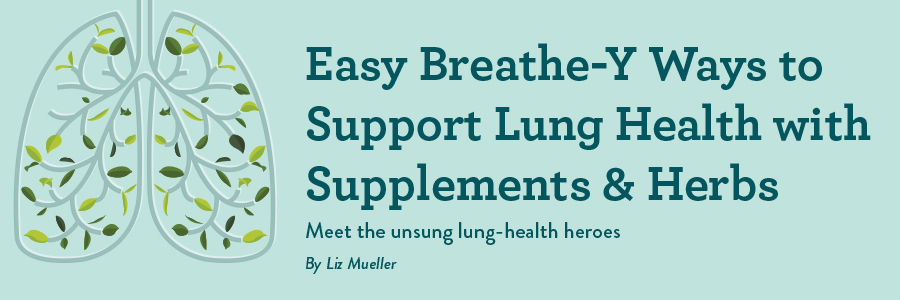


Sign-up for {N}power to get exclusive discounts, newsletters, members-only features, and more!
 Denver - Design District - Alameda and Broadway
Denver - Design District - Alameda and Broadway
368 S Broadway
Denver, CO 80209
United States
 Preferred Store:
Select a Store
Preferred Store:
Select a Store

The past four months have given us a giant dose of reality. In an instant, so much was out of our control. We’ve had to adjust to new routines, roles, and responsibilities at home and at work while being told that there’s a silver lining to these strange, uncertain times. While it may not be obvious at first, part of that silver lining presents itself as an empowering opportunity—an opportunity to stop being a bystander to our health, and to instead take control of and cultivate good health, especially the health of our lungs. From targeted supplements to heroic herbs, there’s nothing more empowering than learning how to support lung health so we can breathe more clearly and more deeply—for ourselves and for our loved ones. While we have to let go of the things we can’t control, our health shouldn’t be one of them.

N-Acetylcysteine (NAC) is first up. A derivative of the amino acid L-cysteine, NAC is required for the body to make glutathione, a powerful internally made antioxidant.1 Glutathione is the primary antioxidant in the lungs and is essential for proper lung function, and studies show that supplementing with NAC increases glutathione levels in the lungs.2 NAC itself has been shown to help alleviate and loosen up mucous secretions associated with pneumonia, bronchitis, and cystic fibrosis and it has been widely studied as a natural remedy for these conditions, as well as for chronic obstructive pulmonary disease (COPD) and respiratory illnesses like the flu.3 4 5 In addition to helping break up mucus, NAC reduces the elevated bacterial counts often seen in the lungs of those with chronic bronchitis, particularly smokers.vi If preventative lung support is what you’re after, taking NAC may help prevent and treat flu-like symptoms. In one double-blind study, taking 600 mg of NAC twice a day resulted in a significant decrease in the frequency of influenza-like episodes, severity, and length of time confined to bed.6 NAC also increases oxygen delivery to the liver and other vital organs throughout the body.
Angelica Root is a wonderful go-to herb for respiratory issues. The plant is known for its expectorant properties and has been used traditionally as an herbal remedy for bronchitis, cough, asthma, and other ailments of the respiratory system.7 There’s even data showing that angelica root increases the release of oxygen to tissues by facilitating blood oxygen transport.8
Mullein is particularly soothing to the mucous membranes and also has expectorant actions.9 It’s no wonder mullein has been used as a traditional herbal remedy for the respiratory tract, particularly in cases of irritating coughs with bronchial congestion. Some herbal texts also extend its therapeutic use to pneumonia and asthma.10
Osha Root, an amazing perennial herb for respiratory health and native to the Rocky Mountain region,11not only helps clear mucous from the sinuses and lungs by increasing expectoration, but also increases blood circulation to the lungs, helping to increase dilation during coughing and constriction.12 Simply put, osha helps you take deeper breaths. Researchers have also studied its effect on oxidative damage, an important aspect of lung health because an infection in the lungs can lead to large amounts of oxidative stress that damages healthy cells. In one test, researchers measured the protective effect of the herb by inducing oxidative stress in human lymphocytes, a type of white blood cell. Lymphocytes were treated with either 0, 50, 100, 200, or 400 micrograms of osha root. At a dose of 400 mcg, osha root reduced lipid oxidation in the lymphocytes by 94 percent and also increased glutathione levels.13 14
Yerba Santa Leaf was listed as an official remedy from 1894–1956 in the U.S. Pharmacopeia, a standardized drug reference, for coughs, pneumonia, and bronchitis.15 16 Its respiratory benefits lie in the herb’s ability to improve respiratory health, clear mucus, and alleviate congestion, as well as open up the lungs. This effect is felt in the sinuses as well and it has the ability to alleviate hay fever and sinusitis.17 18 While all these herbs support lung health individually, when combined in herbal formulas they provide synergistic support that is greater than their individual impact.
Black Seed Oil (black cumin) is an herb native to Southeast Asia and the Middle East and deserves some major cred as a powerful lung supportive supplement. Despite its name, black seed oil typically looks more yellow in capsule or liquid form. It contains thymoquinone, a compound with potent antioxidant properties, which has been shown to have an anti-asthmatic effect on asthmatic airways.19 20 A study published in Phytotherapy Research in 2017 found that “people with asthma who took black seed oil capsules had a significant improvement in asthma control compared with those who took a placebo.”21 It’s also used to boost the body’s immune response and to ease coughs, bronchitis symptoms, and colds.22 23 Black seed oil even shows promise in the treatment of allergies. In a 2011 study, black seed oil was found to reduce the presence of nasal congestion and itching, runny nose, and sneezing after two weeks. Another report published in 2018 concluded that the oil has therapeutic potential in the treatment of sinusitis due to its anti-inflammatory, antioxidant, antihistamine, immune-modulator, antimicrobial, and analgesic effects.24 25



Sign-up for {N}power to get exclusive discounts, newsletters, members-only features, and more!
